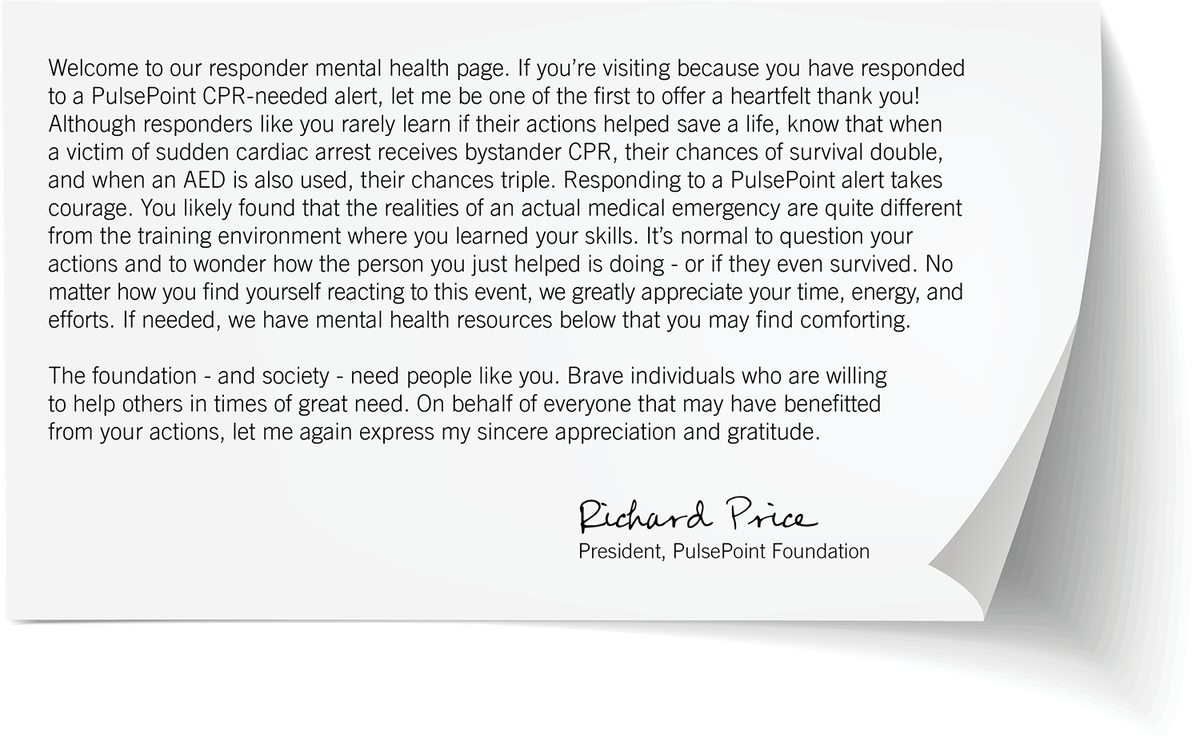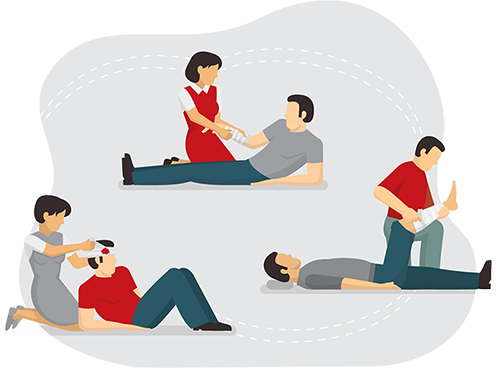Welcome
Responder Mental Health Resources


Mental Health
How are you feeling?
If you find yourself feeling “off” in any way after participating in a cardiac arrest event, this is not abnormal. Multiple physical and emotional effects are possible after responding and can include but are not limited to:
- Physical effects: appetite issues, trouble sleeping, tiredness, sickness
- Emotional effects: loneliness, confusion, intrusive thoughts, anxiety, flashbacks, withdrawal, nightmares, intensely emotional
If you find yourself experiencing any of these effects, we welcome and encourage you to explore the resources below.
Resources
Partner Resources
Cardiac Arrest Survivor Alliance (CASA)
Cardiac Arrest Survivor Alliance™, a program of the Sudden Cardiac Arrest Foundation, is a place for anyone touched by cardiac arrest. CASA fosters an online community for patients, families, friends, caregivers, rescuers, and advocates. Peer support, information resources, and access to experts will help community members recover, re-engage, and thrive. CASA is a home for hope and healing.
The PulsePoint Foundation is a long-standing partner of the Sudden Cardiac Arrest Foundation, and we encourage you to visit and explore their resources.
Heartsight
Heartsight is an initiative created by people impacted by cardiac arrest. It orients and empowers anyone who has been affected by this life-altering event. They connect you to trusted resources based on clinical research and the lived experiences of people like you.
The PulsePoint Foundation is a proud Friends of Heartsight advocate and we encourage you to visit and explore their resources.
Other Helpful Resources
Understanding What You See and Hear During CPR
Frequently asked questions after witnessing a cardiac arrest or performing CPR. Better understanding what you felt, saw, and heard.
Coping with a traumatic event (NIMH)
Overview of trauma, common physical and mental symptoms, coping strategies, and additional resources for finding support from the United States National Institute on Mental Health.
Crisis Text Line
The Crisis Text Line is its own organization where the user texts HOME to 741741 when in distress. They are responded to by a volunteer crisis counselor and are met with appropriate resources.
988 Hotline
The 988 Suicide/Crisis hotline is provided by the U.S. Department of Health and Human Services, more specifically SAMHSA, and allows its users to either text or call the number 988 to receive support in a time of mental health crisis.

Legal Considerations
Good Samaritan Laws
The purpose of the Good Samaritan Law is to protect individuals that assist a victim during a medical emergency. Most Good Samaritan laws are created specifically for the general public. The law assumes that there is no medically trained person available to assist the victim. Since the Good Samaritan typically does not have medical training, the law protects him or her from being liable from injury or death caused to the victim during a medical emergency. A general layperson is protected under the Good Samaritan laws as long as he or she has good intentions to aid the victim to the best of his or her ability during a medical emergency. Since each state law has specific guidelines, and this text does not provide a worldwide view of this matter, you should familiarize yourself with the laws or acts applicable to you. A typical example of the wording appears below.
“…a person, who, in good faith, lends emergency care or assistance without compensation at the place of an emergency or accident, and who was acting as a reasonable and prudent person would have acted under the circumstances present at the scene at the time the services were rendered, shall not be liable for any civil damages for acts or omissions performed in good faith.”
Thank you
Reach out to us
The foundation would love to hear from you. We invite you to share your story or PulsePoint experience. If you are a responder, we would love to recognize you with a challenge coin to express our appreciation!

Disclaimer
The foundation makes no claims, promises, or guarantees about the accuracy, completeness, or adequacy of the contents of this page, and expressly disclaims liability for errors and omissions in the contents and use of these resources.

